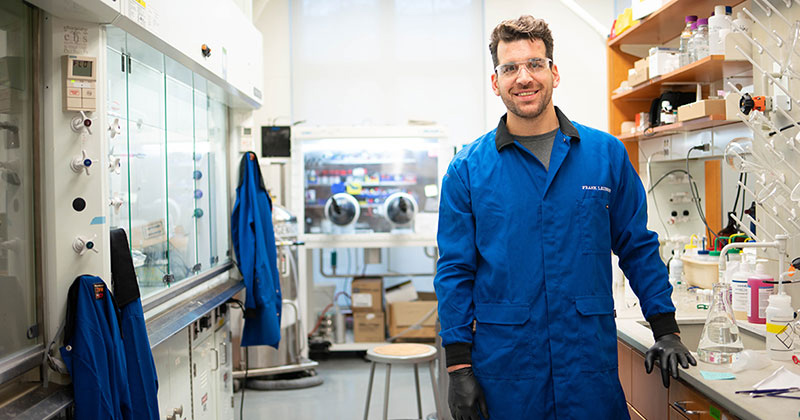The institute’s Faculty Fellowship Program will provide support for Frank Leibfarth, associate professor in the Department of Chemistry within the College of Arts and Sciences, whose research includes expanding options for recycling.

Frank Leibfarth’s research tests molecules to turn plastic waste into useful materials — a potential method of recycling that could upend the industry and prevent recyclable materials from ending up in landfills, incinerators, or as environmental pollutants. It’s the type of inter-disciplinary, translational research that the Institute for Convergent Science (ICS) was created to support.
ICS is a pan-campus unit working to expand the scale and scope of Carolina’s impact on society by translating discovery into solutions through invention, innovation, and enterprise. Established in 2022, the institute delivers resources through a “Ready-Set-Go” framework built around the concepts of readying researchers to converge on an issue, setting projects up for success by developing intellectual property and inventions, and launching the product or technology through the appropriate channels.
“ICS is designed to gather and focus Carolina’s scientific talent to create new technologies, materials, therapeutics, and devices that can be rapidly implemented to improve the lives of North Carolinians and the country as a whole,” says Greg Copenhaver, ICS director. “Frank is a fabulous example of this approach. He has deep, world-class expertise in synthetic chemistry, but also the ability to collaborate productively with partners across the university to create technologies that make a real-world difference, including a way to remove ‘forever chemicals’ from drinking water and novel approaches for turning waste plastic into useful, even high-value, materials.”
The ICS Faculty Fellows Program offers five-year fellowships in collaboration with other Carolina departments and supports researchers pursuing innovation-oriented science to produce impactful solutions to technological or societal issues. Mentorship and information sharing is also built into the program to ensure the continued advancement of UNC-Chapel Hill’s research enterprise.
ICS faculty fellowships invest in researchers instead of specific projects. Leibfarth can choose from his full scope of research, including how to make PFAS-contaminated water safe to drink, when deciding which issues to tackle in the coming years.
“Being named as the inaugural ICS faculty fellow is not only a great honor, but also an exciting opportunity to more intimately connect our innovations in the lab with stakeholders outside of the chemistry department,” Leibfarth says. “My goal is for this opportunity to enable myself and members of my group to think through how our science can make an impact beyond our fundamental discoveries, and ultimately contribute to the thriving innovation infrastructure at UNC-Chapel Hill.”
Leibfarth is part of the chemistry department’s tradition of excellence in polymer and materials research that began with the recruitment of Edward Samulski in 1988. Since then, the department and the College have actively created positions and recruited the most talented hard and soft matter materials chemists in the country, providing them with new laboratories and start-up packages.
Leibfarth and his colleagues form the bedrock of what has become one of the strongest polymer and materials programs in the country and are a testament to Carolina’s commitment to materials research and education.
To support their research and create a hub for scientific collaboration, the department and College have committed to the creation of a soft-matter sub-core that will be housed in the Chapel Hill Analytical and Nanofabrication Laboratory core facility. The sub-core will be maintained and operated by dedicated staff and include instrumentation that will open new research directions in polymer chemistry and materials across Carolina.
ICS Faculty Fellows receive support for navigating the UNC-Chapel Hill innovation ecosystem, training and assistance with IP landscape analysis, competitive market analysis, and customer discovery. The institute also offers AGILE grants, designed to promote cross-campus collaboration by providing up to two years of project support for faculty-led, pre-commercial development teams.
Additional ICS faculty fellows will be announced in the coming months as the institute grows its footprint within the Carolina community.
By Carleigh Gabryel, UNC Research
